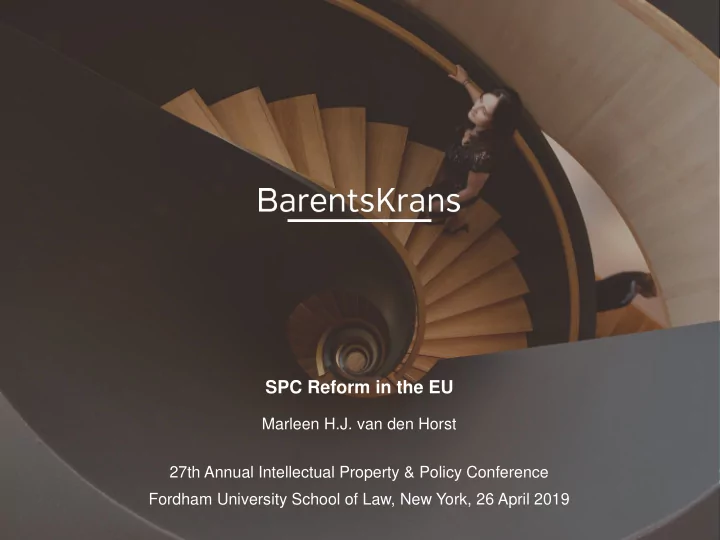

SPC Reform in the EU Marleen H.J. van den Horst 27th Annual Intellectual Property & Policy Conference Fordham University School of Law, New York, 26 April 2019
SPC Reform in the EU Study Max Planck Institute (MPI), ordered by European Commission Follow-up on study by EC? SPC manufacturing waiver Unitary SPC
Study Max Planck Institute MPI Report published on 28 May 2018 (700 pages and 7 annexes) Comprehensive legal review of EU SPC system, including: Rationale, value and merits of SPCs Impact CJEU case law on SPC system and on the practice of NPOs, especially regarding to articles 1 and 3 of Reg. 469/2009 Legal analysis of case law of CJEU and national courts, granting practice NPOs Fact finding through consultation of all stakeholders and NPOs by extensive online survey, interviews and 2 seminars
Summary of 33 MPI Recommendations Consolidate Medicinal Products Regulation by incorporating provisions from Plant Protection Products Reg. 1610/96 Distinguish medicinal products for human and for veterinary use either by splitting Regulation or treat them as different products Clarify definitions, concept of MA Close gap between wording of art. 3 (a) – 3(d) and CJEU case law Clarify whether any patentee or only patentee who obtained MA is entitled to SPC Allow SPC for NAS used in drug/medical device combination Provide for SPC Manufacturing waiver Adopt uniform Bolar exemption in light of UPCA Further unification of procedural aspects SPC grant by NPOs Create system for granting unitary SPCs
Study MPI: Findings & Recommendations MPI: The purpose of the SPC legislation was to compensate patent holders for the time loss in obtaining regulatory approval for products containing new active substances. The original intention of lawmakers was to grant one SPC per product or combination, authorised for the first time. MPI: CJEU has by teleological interpretation extended scope to more SPCs per product, SPCs for new formulations, second medical indications, not insisting on 1 st MA etc. This calls for a political decision. How to be achieved? MPI: Amendment of Regulation Implementing regulations (EC) Soft law in the form of guidelines Response European Commission – Alfonso Calles Sanchez
SPC manufacturing waiver Legislative Proposal (regulation to amend Reg 469/2009) Adopted by European Parliament on 17 April 2019 Expected entry into force July 2019 Background: If SPC protection in EU, but not in non-EU countries, then no production possible in EU. This is disavantageous for: EU based manufacturing industry (research, jobs etc) Competition on EU market and timely access to affordable generics & biosimilars
SPC manufacturing waiver SPC manufacturing waiver allows making of medicinal products: for export to non-EU countries for stockpiling in EU 6 months prior to expiry SPC And any related acts necessary to achieve the same Requirements for maker: File notification (standard form) 3 months prior to start making for export and/or storing or related acts at NPO in Member State where acts will take place Notify SPC holder Label products by use of special logo (no bearing unique identifier) Ensure documented due diligence towards supply chain to ensure compliance
SPC manufacturing waiver Obligation NPOs: Publish notification and updates a.s.a.p. European Commission: should carry out regular evaluation (every 5 years) as to effects and achievement of intended goals Upon entry into force of Regulation: Waiver applies to new SPC applications and to SPCs entering into force 3 years after the Regulation takes effect
Unitary SPC Current SPC status / obstacles: SPCs governed by national law, granted by NPOs Unitary Patent Package provides for Unitary Patent governed by unitary patent law Unitary Patent Package does not provide for a Unitary SPC Policy considerations Unitary SPC: granted by the EPO or a new EU institution? based on a Unitary patent or national patents? based on a European MA or a bundle of national MAs? Status reform: European Commission “ is working on the articulation of unitary patent protection and SPC legislation.”
Thank you for your attention Marleen H.J. van den Horst T: +31 (0)70-376 06 21 M: +31 (0)6 1621 0392 marleen.vandenhorst@barentskrans.nl Lange Voorhout 3 2514 EA The Hague The Netherlands www.barentskrans.nl
Recommend
More recommend